Ukraine war: The role of the Orthodox churches
By Philip Mudartha
Bellevision Media Network
Preface:
There are two wars in Ukraine: First is the physical invasion of Ukraine by Russian Armed Forces to occupy and annex Ukrainian territory. The second is the cold war emanating from the tense relationship between two rival factions of Orthodox Christian Church.
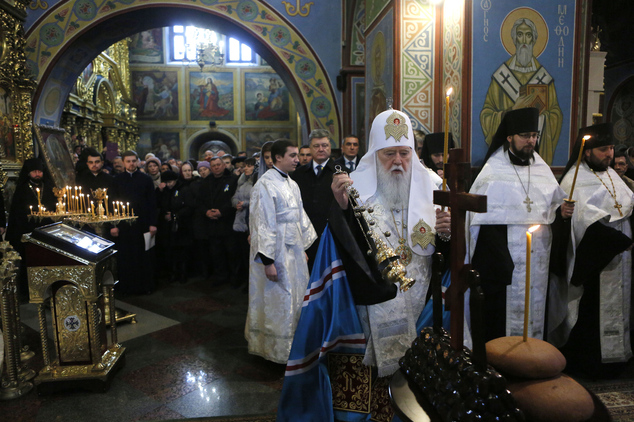
The Russian Orthodox Church (ROC) is the primary church in Russia. Legally known as the Moscow Patriarchate, it is one of the autocephalous Eastern Orthodox Christian churches. It has 194 dioceses inside Russia. The title of primate of the ROC is the Patriarch of Moscow and all Rus’. The ROC, and hence its primate, officially ranks fifth in the Eastern Orthodoxy Hierarchy. The four ancient patriarchates of Constantinople, Alexandria, Antioch, and Jerusalem of the Greek Orthodox Church rank higher in that order. Patriarch Kirill is the primate of ROC since 2009 and has continued his predecessor’s close ties with Kremlin.
Ukraine is characterized by religious diversity. Orthodox Christianity has had a turbulent history in Ukraine, especially since Ukrainian independence from the Soviet Union in 1991. Two rival Orthodox churches claim to be the true Ukrainian Orthodox Church for the Ukrainian people. Besides, there are at least 4 million Catholics, mostly in western Ukraine bordering Poland.
2018 schism in Orthodox Church in Ukraine:
Russia invaded Ukraine and annexed Crimea in 2014, after the ouster of pro-Russia Ukrainian President Viktor Yanukovych through mass civil protests known as Revolution of Dignity.
Since then, relations between the two countries have been strained. These tensions are reflected in the very different approaches of the two churches in Ukraine towards Russia.
The older and larger church is the Ukrainian Orthodox Church – Moscow Patriarchate (UOC-MP). According to Ukrainian government statistics, this church had over 12,000 parishes in 2018. It is a “self-governing” branch of ROC and hence is under the spiritual authority of Patriarch Kirill. Patriarch Kirill and his predecessor, Patriarch Aleksii II, both have repeatedly emphasized the powerful spiritual bonds that link the peoples of Ukraine and Russia.
The other schismatic church, the Orthodox Church of Ukraine - Kyiv Patriarchate (OCU-KP) is nationalistic in character and celebrates its independence from Moscow. With the blessing of the Ecumenical Patriarch Bartholomew of Constantinople, a solemn council met in Kyiv in December 2018, created the new church, and elected its leader, Metropolitan Epifaniy. In January 2019, Patriarch Bartholomew formally recognized the OCU-KP as a separate, independent and equal member of the worldwide communion of Orthodox churches.
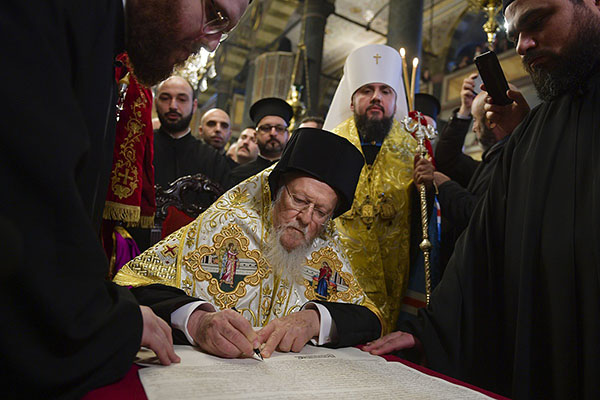
Completely self-governing, the OCU-KP was the culmination of decades of efforts by Ukrainian believers who wanted their own national church, free from any foreign religious authority. As an expression of Ukrainian spiritual independence, the “autocephalous” OCU-KP has been a challenge to Moscow. Patriarch Kirill does not recognize the authority of Ecumenical Bartholomew of Constantinople to issue “tomos”. Tomos is the patriarchal charter that officially confirms the canonical autocephalous status of OCU-KP as one of the 15 national Orthodox Churches in the world. Patriarch Kirill holds Ukraine as his canonical territory, under the “1686 letter of tomos” issued by the Ecumenical Patriarchate.
According to Patriarch Bartholomew, The Holy Synod of the Ecumenical Patriarchate has decided to terminate the tomos issued in 1686 and therefore, the Kyiv Patriarchate led by Metropolitan Epifaniy reports directly to Ecumenical Patriarchate of Constantinople as the mother church.
The ROC and other national Orthodox Churches view these decisions as hostile and illegitimate. The Kiev metropolitan canonical territory which was incorporated into the Moscow Patriarchate in 1686 did not coincide with the present-day territory of the Ukrainian Orthodox Church. It was much smaller. It did not include Donbass, Odessa and other regions. To say that the entire territory of Ukraine has been under Constantinople’s canonical jurisdiction for 300 years runs counter to historic truth. Hence, the decision to annul the 1686 tomos is a hostile and illegal act.
A common Orthodox Christian tradition:
Orthodox Christians in both Russia and Ukraine trace their faith back to the conversion in A.D. 988 of the Grand Prince of Kyiv. Known as Vladimir by Russians and Volodymyr by Ukrainians, the pagan grand prince was baptized by missionaries from Constantinople, the capital of the Byzantine Empire. Kyiv became the most important religious center for the East Slavs.
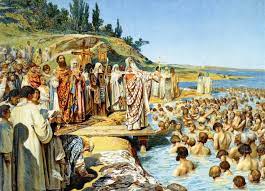
Destroyed in 1240 by the Mongols, Kyiv fell into decline and its northern neighbor, Moscow, became increasingly powerful. By 1686, Russia had conquered eastern Ukraine and Kyiv. In that year, the patriarch of Constantinople formally transferred his spiritual authority over Ukraine to the patriarch of Moscow.
In the 20th century, a growing nationalist movement demanded Ukrainian independence for both the church and the state. Although Ukraine became an independent country in 1991, its only universally recognized national Orthodox Church remained subject to Moscow.
Poroshenko Project of national Orthodox Church:
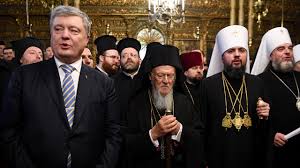
In April 2018 Petro Poroshenko, then the president of Ukraine, tried to form an autocephalous Ukrainian Orthodox Church. At that time, many Ukrainians rejected the authority of Patriarch of Moscow over the UOC (MP) in their country. Patriarch Bartholomew supported the “Poroshenko Project” of an independent national orthodox church for Ukraine, free from Russian control. Bartholomew argued that he had the authority to grant autocephaly. Because Ukraine had originally received Christianity from the Byzantines, Constantinople was Kyiv’s mother church.
In December 2018 a unification council formally dissolved the other branches of Orthodoxy in Ukraine and created the Orthodox Church of Ukraine. In January 2019, Bartholomew signed the tomos, proclaiming the new church autocephalous.
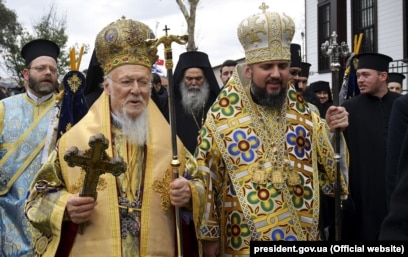
Four national autocephalous orthodox churches, of Constantinople, Alexandria, Greece and Cyprus, recognized OCU-KP and welcomed the new church.
Three other autocephalous churches have explicitly rejected the new church. The Moscow Patriarchate broke communion with Constantinople over its role in creating the new church.
Two visions of history:
Today, the two major rival expressions of Orthodoxy in Ukraine reflect two different historical visions of the relationship between Russians and Ukrainians. For the Moscow Patriarchate, Russians and Ukrainians are one people. Therefore, a single church should unite them. President Vladimir Putin is an avid believer of this argument; so also, is Patriarch Kirill. Both characterize the OCU-KP as an attack on the “spiritual unity” of the Russian and Ukrainian peoples.
The OCU-KP holds a different view. Metropolitan Epifaniy firmly rejects “Russian imperial traditions.” As a separate people with a unique culture, Ukrainians require an independent church.
For now, it remains a source of controversy between Russia and Ukraine. Consequently, the loyalties of millions of believers in Ukraine are divided between the Kyiv and Moscow patriarchates. Of the 45 dioceses comprising of nearly 20,000 parishes, at least 22 dioceses pledge their loyalty to Moscow Patriarch. These are mostly in the Russian Speaking Crimea and Donbass region in Eastern Ukraine.
This reflects not only the continuing military conflict between the two countries since 2014, but also the important political role Orthodox Christianity plays in the region. The split between the Orthodox churches in the two countries is part and parcel of a wider history of political tensions between Russia’s geopolitical ambitions in the region and Ukraine’s resistance to them.
The position of the Orthodox churches in Ukraine:
Both the Orthodox churches in Ukraine have referred to Putin’s “special military operation” as "war" and condemned it emphatically. The OCU-KP’s reaction was expected anyway; however, for Metropolitan Onuphry of UOC-MP to speak of an "invasion" of Ukraine and call on Putin to end it is both brave and unexpected. Especially since, Patriarch Kirill has repeatedly blessed Putin and the Russian Army calling it a “holy and just war” against “Antichrist”. Meanwhile, the holy synod of the UOC-MP has called upon Patriarch Kirill to use his influence on Putin and work for peace.
Russia’s war of aggression against Ukraine is driving a wedge into the Orthodox Church. While the head of the ROC, Patriarch Kirill, has justified the war, it has been condemned by orthodox churches both within Ukraine and worldwide. Some priests of ROC in Russia too have spoken out against the war.
Patriarch Kirill presents Vladimir Putin’s war as a legitimate resistance to Western values in his sermons in Moscow. He deplores the western scourges like excess consumption, gay pride parades and other immoral liberal values, which he claims were intended to be imposed on the Russian Speaking Christians in Donbass.
Having failed to unequivocally condemn the killing of innocent people in Ukraine, or call for a ceasefire, Patriarch Kirill suggested in sermons that the Kremlin’s war is a righteous one about the future of Christianity. He said the Russian soldiers are doing God’s work in Ukraine. In other words, God the Savior is on Russian side.
But, many of his parishioners in Ukraine are deserting him: "When we hear our patriarch say the Russian soldiers are protecting us and fighting some ’Holy War’, we know they are either blind, or they are not serving God but the devil." Nearly half of dioceses in Ukraine belonging to Moscow Patriarchate have stopped praying for Patriarch Kirill. It is an Orthodox Christian tradition to pray for their patriarch, just as Roman Catholics pray for the Pope.
Patriarch Kirill is a trusted advisor to President Vladimir Putin, and benefits from his support to Putin. So, he cannot but support Putin in this war, which the rest of the world sees as fratricidal and unjust. His bête noire Ecumenical Orthodox Patriarch of Constantinople Bartholomew I openly condemned the war saying “the whole world is against Russia.” And in front of a crowd at St. Peter’s square in the Vatican, Pope Francis pleaded, “In the name of God, I ask you: stop this massacre,” calling the invasion an act of “unacceptable armed aggression.”
Can Pope Francis end this senseless war?
Since Russian troops invaded on Feb. 24, Pope Francis has been vocal in calling for an end to this senseless war but he has not specifically named Russia as the aggressor. Probably, he wants to keep dialogue open between Russia and the Holy See. The pope has offered the Vatican as a mediator in the conflict, which Ukraine has welcomed and Russia has not. Ukrainian President Volodymyr Zelensky has invited Pope Francis to visit Ukraine and deliver a message of peace and solidarity. Pope Francis has signaled his openness to visiting and admitted, that the possibility “is on the table.”
But there are important points to consider: How would such a gesture affect Vatican-Russia and Catholic-Orthodox relations? Is a papal visit even possible or advisable given the pope’s recent knee problems? Above all, what would such a papal visit achieve? And what about his security while he is in Kyiv? Would Moscow co-operate and agree for temporary cease-fire?
Nevertheless, to show his solidarity with Ukrainian nation, in an unprecedented move, the pope drove to the Russian Embassy and personally expressed his concerns about the war to the ambassador. Certainly, that was unprecedented!
Pope Francis has sent messages to Putin seeking to meet him in Moscow in person. His request and repeated reminders have gone unanswered. Putin is not willing to meet the pope for whom he does not have much respect. In his earlier two visits to Vatican, Putin has been late by 45 minutes to scheduled papal audience showing that he does not care!
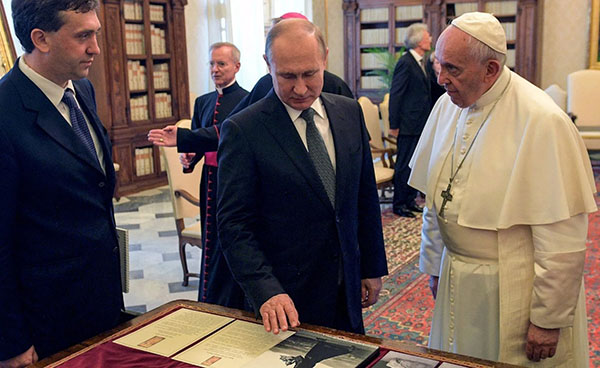
Even so, the pope has been praying for peace in Ukraine and would like to be a mediator between the warring parties in the conflict.
Pope Francis has tried on many occasions to foster a deeper relationship with the Patriarch Kirill. Moscow Patriarchate has been invited numerous times to attend events at the Vatican. But Patriarch Kirill has not sent any of his representatives in order to snub the pope who has better relations with Ecumenical Patriarch of Constantinople Bartholomew. The pope is not getting anywhere with this patriarch.
The pope is probably convinced that attempts to hold dialogue with Russia are not going to go anywhere with this patriarch. Patriarch Kirill and Putin have a symbiotic relationship. They are just intertwined, like Siamese twins: Putin uses Kirill, and Kirill probably uses Putin. They are in a marriage of convenience. Pope Francis has warned Patriarch Kirill, “not to become Putin’s altar boy"! Kirill does not care what the pope thinks of him.
NATO is “barking up” at Russia’s door:
In a balancing act, Pope Francis has recently publicly stated his views on NATO expansionism since 1997. The pope said that NATO was “barking” at Russia’s door.
Questioning the conflict’s causes, the pope spoke of an "anger" in the Kremlin which could have been "facilitated" by "the barking of NATO at Russia’s door".
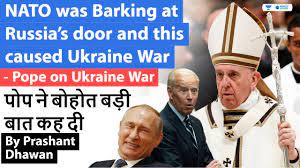
The remarks came as the pope reiterated that he requested a meeting with Russian president Vladimir Putin over Ukraine, while comparing the scale of the bloodshed in the country to the genocide in Rwanda.
“I’m not going to Kyiv for now. I feel I shouldn’t go. I have to go to Moscow first, I have to meet Putin first," the pope said.
Knowing Putin and Kirill, that is another futile papal wish!
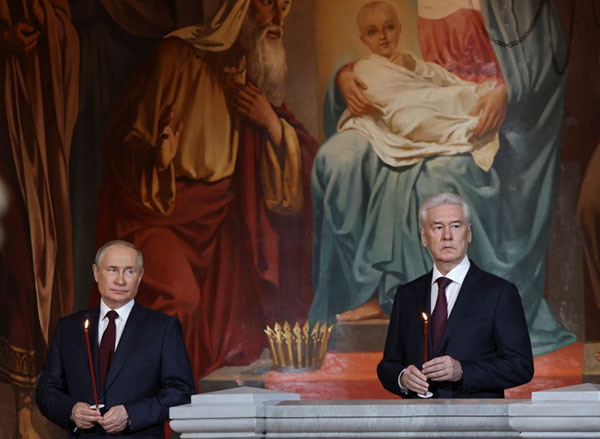
President Putin attended the midnight Orthodox Easter service at the Cathedral of Christ the Savior in Moscow, which was presided over by Patriarch Kirill. Patriarch Kirill had endorsed Putin’s election in 2012, referring to Putin’s tenure in the 2000s as "God’s miracle." In return, the ROC enjoys the patronage of President Putin and Russian state.
Like Putin, Kirill too is a former KGB spy and serves as a close advisor to Kremlin. Patriarch Kirill considers Russia, Ukraine and Belarus as one Slavic nation named “Russian Lands” which resonates with Putin’s Novo-Russia ambitions.
 Write Comment |
Write Comment |  E-Mail To a Friend |
E-Mail To a Friend |
 Facebook |
Facebook |
 Twitter |
Twitter |
 Print
Print 


















